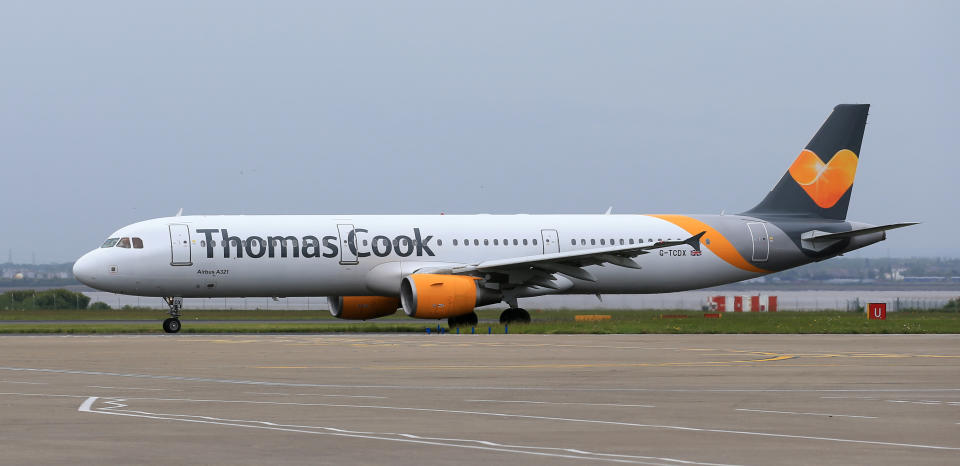What should holidaymakers do now that Thomas Cook has collapsed?

Travel operator Thomas Cook (TCG.L) collapsed overnight after it failed to secure the funding it needed to continue trading, leaving more than 150,000 holidaymakers stranded abroad.
Hundreds of flights have been cancelled, disrupting the travel plans of tens of thousands of people and triggering the largest-ever peacetime repatriation in UK history.
The cost of repatriating and compensating customers is estimated to be as much as £600m.
The situation arose after Thomas Cook’s creditors, which include banks like Royal Bank of Scotland (RBS.L) and Lloyds Bank (LLOY.L), demanded an additional £200m in funding as part of a rescue package for the 178-year-old company.
The travel operator failed to secure the funding and thus collapsed into liquidation early on Monday morning.
Here is where that leaves holidaymakers.
READ MORE: Thomas Cook is dead and 150,000 UK holidaymakers are stranded
What happens if you’ve booked a package holiday?
Holidaymakers who’ve booked package holidays with the flagging tour operator are protected by ATOL, a financial protection scheme run by the Civil Aviation Authority that is funded by contributions from tour operators.
ATOL protects most consumers who’ve booked package holidays — meaning that, even those who are abroad will be able to continue their holiday, because their accommodation and return flights are effectively guaranteed.
Those with bookings will likewise be offered a full refund, but the Civil Aviation Authority has said its entire focus at the moment is on getting people home.
“As soon as that’s over in a couple of weeks, we’ll be starting on refunds,” said Dame Deirde Hutton, the chair of the authority, on Monday.
“But in a couple of weeks we will be starting a refunding programme and we expect to complete that within two months.”
Package holidays booked through Condor, Thomas Cook’s German subsidiary, are covered by a mandatory insurance scheme that is similar to ATOL, and those customers will also be repatriated.
What happens if you’ve only booked flights and are abroad?
If you’ve only booked flights with Thomas Cook, you are not entitled to ATOL protection from the Civil Aviation Authority, which only covers package holidays.
However, as part of the largest peacetime repatriation efforts the UK has ever seen, the UK government has said that anyone due to return on a Thomas Cook flight within the next two weeks will be brought home.
Transport secretary Grant Shapps said on Monday that the government had hired dozens of charter planes as part of the operation.
“Under normal circumstances, passengers who are not ATOL protected would be asked to find, and pay for, their own way home,” a government statement said.
“However, given the extent of the disruption the government is stepping in to assist impacted passengers and get people home.”
The move mirrors one made after the October 2017 collapse of Monarch Airlines, when the government specially chartered around 700 flights over a two-week period, at an estimated cost of £60m to the UK taxpayer.
While many holidaymakers experienced some disruption to their travel plans, pretty much everyone got home at no further cost.
What happens if you’ve only booked flights and have yet to travel?
If you booked the flights using a credit card directly with Thomas Cook, and the costs of the flights was more than £100, then it may be possible to get your money back from your credit card company under Section 75 of the Consumer Credit Act.
“Using a credit card responsibly and not spending beyond your means offers you a bit more protection, which can prove invaluable in situations such as this,” said Alastair Douglas, CEO of advisory firm TotallyMoney.
“Lack of knowledge of these situations often leaves consumers out of pocket, thinking there’s nothing to be done, when really that’s not the case.”
Douglas said that customers should contact their credit card company — such as their bank or building society — if there is any doubt about what they are entitled to.
Customers who purchased the flights using a debit card, unfortunately, are not entitled to any protection under Section 75. However, if you have travel insurance, it is possible that you could be compensated that way.
What happens to the UK travel industry?
The UK travel industry is now left with only one significant package holiday company, TUI. That means less competition, which could lead to higher prices.
Manuel Cortes, the general secretary of the Transport Salaried Staffs Association, had warned on Friday that Thomas Cook should be rescued “no matter what”.
“If Thomas Cook goes under, we will be left with just one major travel operator — TUI — controlling the mass market. If need be the government must step in to ensure Thomas Cook’s survival,” he said.
Civil Aviation Authority information with details of each flight
The Civil Aviation Authority’s 24-hour helpline for Thomas Cook customers can be reached on 0300 303 2800 from the UK and Ireland and +44 1753 330 330 from overseas.

 Yahoo Finance
Yahoo Finance 
